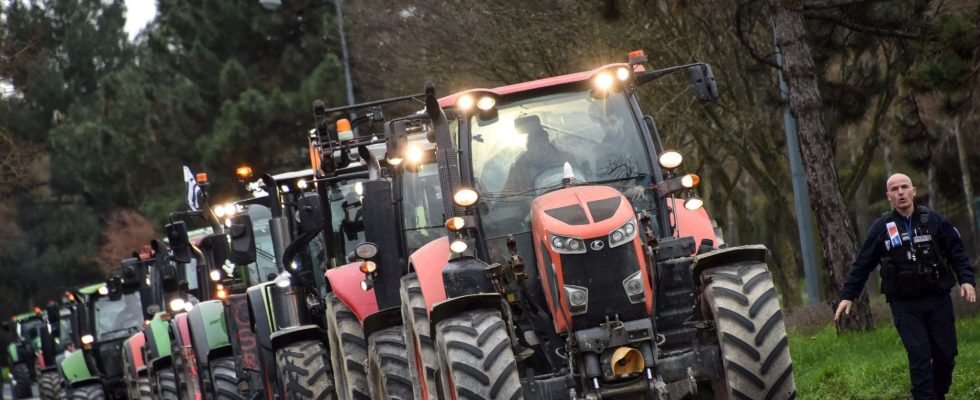A decline, but not yet the epilogue: farmers followed the slogan of the FNSEA and the Young Farmers (JA), in the majority, to lift the blockages after a series of government concessions. But some want to continue the movement.
Information to remember
⇒ End of blockage on several roads
⇒ The Peasant Confederation called on Thursday to “continue the mobilization”
⇒ The IMF is concerned to see States extend aid to farmers
The places where the blockades are lifted…
On Thursday, signs of relaxation increased, notably with the end of the blockage of the Cheviré bridge crossing the mouth of the Loire at Nantes (Loire-Atlantique) or the departure of farmers from the dams which cut off the A6 at the toll level. from Villefranche-sur-Saône to the north of Lyon or the A81 between Le Mans and Brittany.
In the evening, the prefectures reported lifting of blockades almost everywhere in the country, or at the very least reductions, even if occasional blockages persisted, according to Matignon. At the national level on Thursday at 7 p.m., we noted a “very slow decline” in the dams, a police source told AFP, even if “this slowness should not be interpreted other than as a bit of a vigil. “arms and communion of farmers who fought for ten days to obtain guarantees”.
Around Lyon, “all the points that we have mastered” will be lifted this Friday at “2 p.m.”, Michel Joux, head of the FRSEA, told AFP. Some have already been lifted, such as on the A6 north of Lyon, while others will be lifted in the morning, such as the one located on the A7-M7 in Oullins-Pierre-Bénite, specifies BFMTV.
In Occitania, once the epicenter of the movement of anger but losing momentum since the arrival of Prime Minister Gabriel Attal a week ago, the new series of announcements has led to the lifting – immediate or soon – of several roadblocks, particularly in Aveyron and Gers. As indicated by BFMTV, in Epône (Yvelines) the dam installed since Tuesday evening on the A13 has also been in operation for the last few minutes this Friday morning while that of Jossigny (Seine-et-Marne) on the A4 has already been lifted .
…And those where the blockage persists
Blockages persisted Thursday evening on the A7 to the south and on the A43 to the east where farmers present at the call of the Confédération paysanne indicated their intention to stay. In Saint-Etienne-de-Montluc (Loire-Atlantique), where another union, Rural Coordination, is present, around fifty farmers remain, according to BFMTV. The Peasant Confederation called on Thursday to “continue mobilization” because “the fundamental question of income” is “still not tackled head-on by the government” according to it.
“The match is not over”
“It was a historic, tough, strong mobilization… We gave ourselves the means to return to the negotiating table. We had to do this for the future, for our young people,” Laurent Saint told AFP. -Affre. The FDSEA delegate from Aveyron, however, warned that “the match is not over: there still remains the point of tension, the shadow on the board, that of Lactalis which does as it pleases on the price of milk. So we could get the tractors out again in a few days to go for a little trip there…”
“We have decided that at this time, in view of everything that has been announced […]we need to change our modes of action and therefore we call our networks […] to suspend the blockages and enter into a new form of mobilization”, indicated Thursday the president of Young Farmers (JA) Arnaud Gaillot, alongside the boss of the FNSEA Arnaud Rousseau, during a press conference in Paris.
A big demonstration in Brussels
Beyond France, all of European agriculture is affected by a movement of anger. At the end of a day which saw some 1,200 tractors converge in Brussels, Belgium, the European Commission on Thursday promised measures to defend the “legitimate interests” of European farmers, “by guaranteeing fair conditions of competition” or by reducing the “administrative burden” of the criticized common agricultural policy (CAP).
The IMF is concerned to see States extend aid
Kristalina Georgieva, general director of the IMF, assured that she “understood” the difficulties of farmers who have been demonstrating for several days in Europe, particularly in France. However, she was concerned on Thursday to see States extending aid instead of carrying out “necessary” budgetary consolidation.
Speaking to the press, Kristalina Georgieva assured that she “understands, from a human point of view, (that farmers) face more difficulties and that it is not easy to do the work they do “. But “if this puts governments against the wall and prevents them from doing what is necessary to strengthen economies, there may come a time when we might regret it.”
The IMF has been insisting for several months that states, particularly the richest, gradually end the aid that had been put in place to support their economies during the pandemic, then in the face of shocks linked to the sudden rise in inflation and to the consequences of the Russian invasion of Ukraine. Kristalina Georgieva has repeatedly highlighted the risk of seeing States face “looming shocks” without having the necessary budgetary space, while debt rates have increased sharply in recent years.
